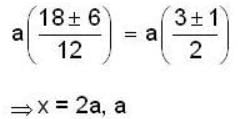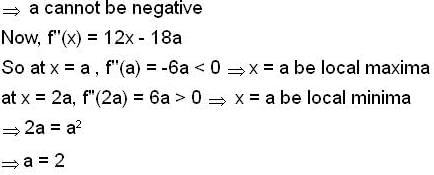Mathematics Exam > Mathematics Questions > If the function f(x) = 2x3 - 9ax2 + 12a2x +1 ...
Start Learning for Free
If the function f(x) = 2x3 - 9ax2 + 12a2x +1 has a local maximum at x = x1 and a local minimum at x = x2 such that x2 = x21, then a is equal t o _______ .
Correct answer is '2'. Can you explain this answer?
| FREE This question is part of | Download PDF Attempt this Test |
Verified Answer
If the function f(x) = 2x3 - 9ax2 + 12a2x +1 has a local maximum at x ...
Given f(x) = 2x3 - 9ax2 + 12a2x +1

for max or min, f (x) = 0
⇒ 6x2-18ax + 12a2 = 0





for max or min, f (x) = 0
⇒ 6x2-18ax + 12a2 = 0




Most Upvoted Answer
If the function f(x) = 2x3 - 9ax2 + 12a2x +1 has a local maximum at x ...
Given Information:
- Function: f(x) = 2x^3 - 9ax^2 + 12a^2x + 1
- Local maximum at x = x1
- Local minimum at x = x2
- x2 = x1^2
Explanation:
To find the value of 'a' that satisfies the given conditions, we need to analyze the behavior of the function f(x).
Finding the Derivative:
First, let's find the derivative of the function f(x) with respect to x. This will help us determine the critical points and the behavior of the function.
f'(x) = d/dx (2x^3 - 9ax^2 + 12a^2x + 1)
= 6x^2 - 18ax + 12a^2
Finding the Critical Points:
To find the critical points, we need to set the derivative equal to zero and solve for x.
6x^2 - 18ax + 12a^2 = 0
Case 1: x1 is a critical point (local maximum):
If x1 is a local maximum, then the derivative at x1 is equal to zero and the second derivative at x1 is negative.
f'(x1) = 0
6x1^2 - 18ax1 + 12a^2 = 0
f''(x1) < />
d^2/dx^2 (6x^2 - 18ax + 12a^2) < />
12x1 - 18a < />
Solving the above two equations simultaneously, we can find the value of x1 and 'a'. However, we are given that x2 = x1^2, so let's substitute x1^2 for x2 in the equations.
Case 2: x2 is a critical point (local minimum):
If x2 is a local minimum, then the derivative at x2 is equal to zero and the second derivative at x2 is positive.
f'(x2) = 0
6x2^2 - 18ax2 + 12a^2 = 0
f''(x2) > 0
d^2/dx^2 (6x^2 - 18ax + 12a^2) > 0
12x2 - 18a > 0
Since x2 = x1^2, let's substitute x1^2 for x2 in the equations.
Substituting x1^2 for x2:
- In the equation 6x1^2 - 18ax1 + 12a^2 = 0, replace x2 with x1^2:
6x1^2 - 18ax1 + 12a^2 = 0
- In the equation 12x2 - 18a > 0, replace x2 with x1^2:
12x1^2 - 18a > 0
Simplifying the Equations:
Now, let's simplify the equations to solve for 'a'.
Equation 1: 6x1^2 - 18ax1 +
- Function: f(x) = 2x^3 - 9ax^2 + 12a^2x + 1
- Local maximum at x = x1
- Local minimum at x = x2
- x2 = x1^2
Explanation:
To find the value of 'a' that satisfies the given conditions, we need to analyze the behavior of the function f(x).
Finding the Derivative:
First, let's find the derivative of the function f(x) with respect to x. This will help us determine the critical points and the behavior of the function.
f'(x) = d/dx (2x^3 - 9ax^2 + 12a^2x + 1)
= 6x^2 - 18ax + 12a^2
Finding the Critical Points:
To find the critical points, we need to set the derivative equal to zero and solve for x.
6x^2 - 18ax + 12a^2 = 0
Case 1: x1 is a critical point (local maximum):
If x1 is a local maximum, then the derivative at x1 is equal to zero and the second derivative at x1 is negative.
f'(x1) = 0
6x1^2 - 18ax1 + 12a^2 = 0
f''(x1) < />
d^2/dx^2 (6x^2 - 18ax + 12a^2) < />
12x1 - 18a < />
Solving the above two equations simultaneously, we can find the value of x1 and 'a'. However, we are given that x2 = x1^2, so let's substitute x1^2 for x2 in the equations.
Case 2: x2 is a critical point (local minimum):
If x2 is a local minimum, then the derivative at x2 is equal to zero and the second derivative at x2 is positive.
f'(x2) = 0
6x2^2 - 18ax2 + 12a^2 = 0
f''(x2) > 0
d^2/dx^2 (6x^2 - 18ax + 12a^2) > 0
12x2 - 18a > 0
Since x2 = x1^2, let's substitute x1^2 for x2 in the equations.
Substituting x1^2 for x2:
- In the equation 6x1^2 - 18ax1 + 12a^2 = 0, replace x2 with x1^2:
6x1^2 - 18ax1 + 12a^2 = 0
- In the equation 12x2 - 18a > 0, replace x2 with x1^2:
12x1^2 - 18a > 0
Simplifying the Equations:
Now, let's simplify the equations to solve for 'a'.
Equation 1: 6x1^2 - 18ax1 +

|
Explore Courses for Mathematics exam
|

|
Similar Mathematics Doubts
If the function f(x) = 2x3 - 9ax2 + 12a2x +1 has a local maximum at x = x1 and a local minimum at x = x2 such that x2 = x21, then a is equal t o _______ .Correct answer is '2'. Can you explain this answer?
Question Description
If the function f(x) = 2x3 - 9ax2 + 12a2x +1 has a local maximum at x = x1 and a local minimum at x = x2 such that x2 = x21, then a is equal t o _______ .Correct answer is '2'. Can you explain this answer? for Mathematics 2024 is part of Mathematics preparation. The Question and answers have been prepared according to the Mathematics exam syllabus. Information about If the function f(x) = 2x3 - 9ax2 + 12a2x +1 has a local maximum at x = x1 and a local minimum at x = x2 such that x2 = x21, then a is equal t o _______ .Correct answer is '2'. Can you explain this answer? covers all topics & solutions for Mathematics 2024 Exam. Find important definitions, questions, meanings, examples, exercises and tests below for If the function f(x) = 2x3 - 9ax2 + 12a2x +1 has a local maximum at x = x1 and a local minimum at x = x2 such that x2 = x21, then a is equal t o _______ .Correct answer is '2'. Can you explain this answer?.
If the function f(x) = 2x3 - 9ax2 + 12a2x +1 has a local maximum at x = x1 and a local minimum at x = x2 such that x2 = x21, then a is equal t o _______ .Correct answer is '2'. Can you explain this answer? for Mathematics 2024 is part of Mathematics preparation. The Question and answers have been prepared according to the Mathematics exam syllabus. Information about If the function f(x) = 2x3 - 9ax2 + 12a2x +1 has a local maximum at x = x1 and a local minimum at x = x2 such that x2 = x21, then a is equal t o _______ .Correct answer is '2'. Can you explain this answer? covers all topics & solutions for Mathematics 2024 Exam. Find important definitions, questions, meanings, examples, exercises and tests below for If the function f(x) = 2x3 - 9ax2 + 12a2x +1 has a local maximum at x = x1 and a local minimum at x = x2 such that x2 = x21, then a is equal t o _______ .Correct answer is '2'. Can you explain this answer?.
Solutions for If the function f(x) = 2x3 - 9ax2 + 12a2x +1 has a local maximum at x = x1 and a local minimum at x = x2 such that x2 = x21, then a is equal t o _______ .Correct answer is '2'. Can you explain this answer? in English & in Hindi are available as part of our courses for Mathematics.
Download more important topics, notes, lectures and mock test series for Mathematics Exam by signing up for free.
Here you can find the meaning of If the function f(x) = 2x3 - 9ax2 + 12a2x +1 has a local maximum at x = x1 and a local minimum at x = x2 such that x2 = x21, then a is equal t o _______ .Correct answer is '2'. Can you explain this answer? defined & explained in the simplest way possible. Besides giving the explanation of
If the function f(x) = 2x3 - 9ax2 + 12a2x +1 has a local maximum at x = x1 and a local minimum at x = x2 such that x2 = x21, then a is equal t o _______ .Correct answer is '2'. Can you explain this answer?, a detailed solution for If the function f(x) = 2x3 - 9ax2 + 12a2x +1 has a local maximum at x = x1 and a local minimum at x = x2 such that x2 = x21, then a is equal t o _______ .Correct answer is '2'. Can you explain this answer? has been provided alongside types of If the function f(x) = 2x3 - 9ax2 + 12a2x +1 has a local maximum at x = x1 and a local minimum at x = x2 such that x2 = x21, then a is equal t o _______ .Correct answer is '2'. Can you explain this answer? theory, EduRev gives you an
ample number of questions to practice If the function f(x) = 2x3 - 9ax2 + 12a2x +1 has a local maximum at x = x1 and a local minimum at x = x2 such that x2 = x21, then a is equal t o _______ .Correct answer is '2'. Can you explain this answer? tests, examples and also practice Mathematics tests.

|
Explore Courses for Mathematics exam
|

|
Suggested Free Tests
Signup for Free!
Signup to see your scores go up within 7 days! Learn & Practice with 1000+ FREE Notes, Videos & Tests.


















